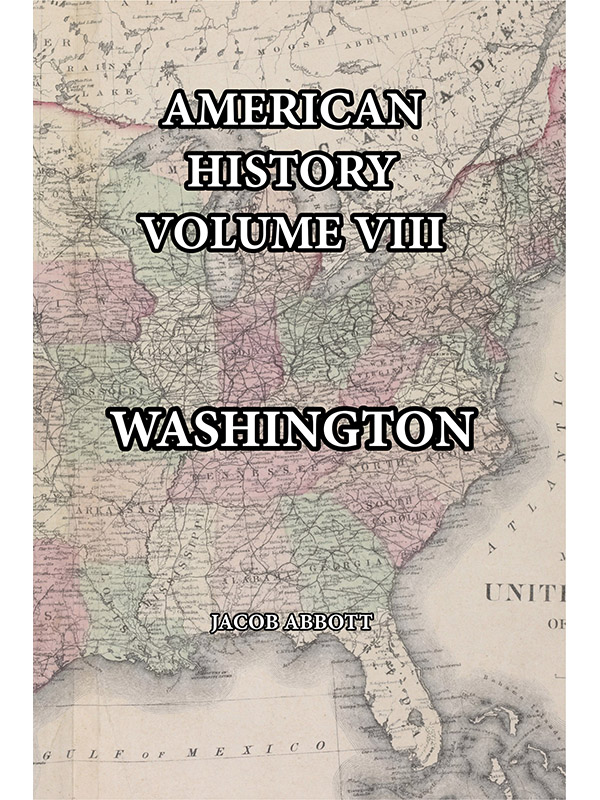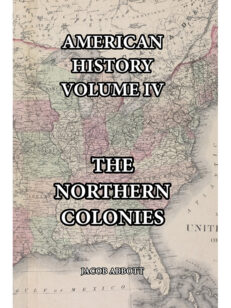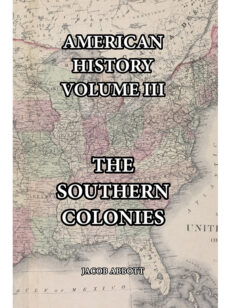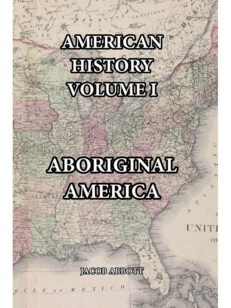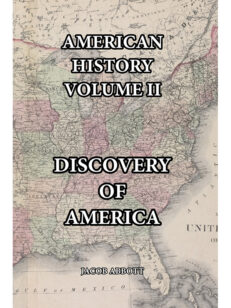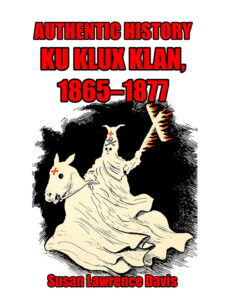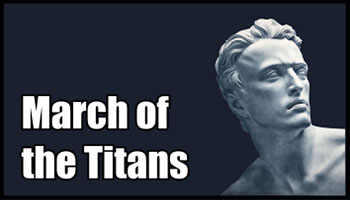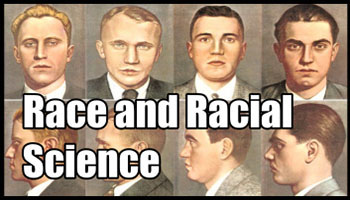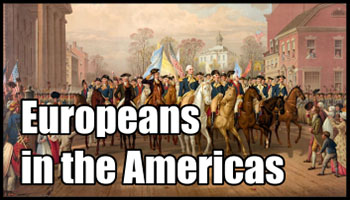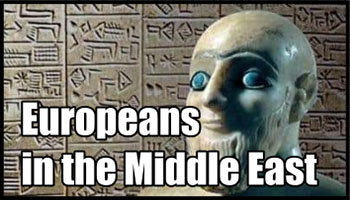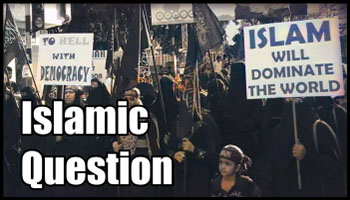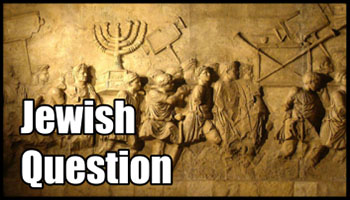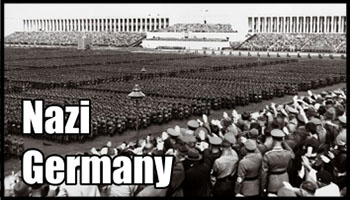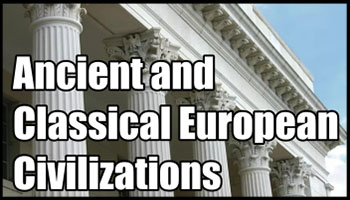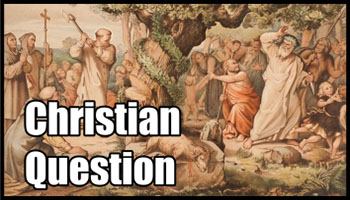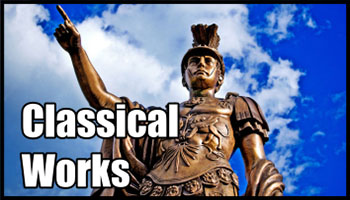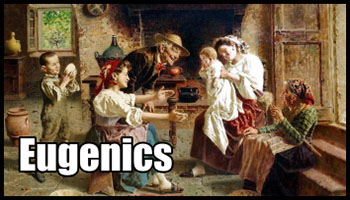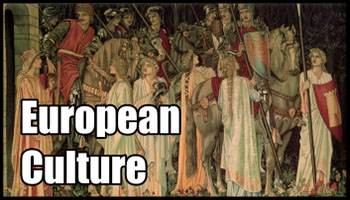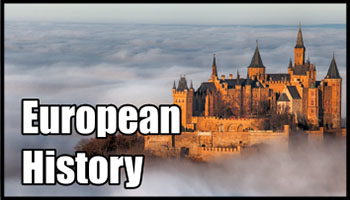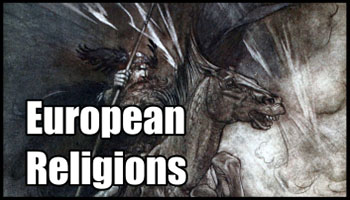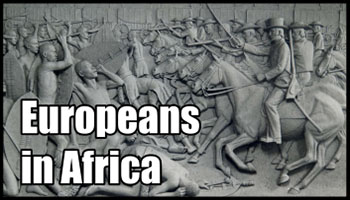Description
Part eight of an eight part series on the history of America from its earliest times through to the age of George Washington, told by master storyteller Jacob Abbott. In this ultimate volume, Abbott tells the story of the life of George Washington, the military leader of the American Revolution, and the first president of the nation he led to victory against the British Empire.
This is no dry autobiography—it is an action-packed insider view of the American Revolution, and the creation of the United States. It tells of Washington’s early life, his family background, his early military career, and his first retirement and farming activities at Mount Vernon. This period also includes many little-known personal details, drawn together using Abbott’s famous original research methodology.
Washington’s recall to public service by the Continental Congress to lead the revolution, his victory, election as first president, policies, and the creation of the branches of government, are then recounted, providing once more many fascinating details and revelations on how the great issues of the day were addressed—which still have ramifications to the present day.
On the nature of the greatness of Washington:
“Washington was, as it were, the first of a new class of great men, such as the world before his day had scarcely known—that is, of men who acquire renown not by imposing their ideas and enforcing their will upon their countrymen, but by embodying and carrying into effect the ideas and determinations which their countrymen had previously formed.
“Washington did not originate the idea of the independence of America, as perhaps Julius Cæsar did that of the universal empire which he founded.
“The conception of American independence and nationality was gradually developed in the public opinion of a widely extended, intelligent, and well informed community.
“Washington was called upon to give effect to the will of this community, and for this purpose vast powers were put into his hands. When the work was accomplished he resigned the power, and returned to his retirement, leaving to that great community itself the entire responsibility of future action.”
Contents
CHAPTER I: Early Days
The Five Periods of Washington’s Life.—Birthplace of Washington.—The Mother of Washington.—His School.—Washington’s Brother Lawrence.—The Estate at Mount Vernon.—The Fairfax Family.—Washington’s Connection with the Fairfax Family.—General Geographical Features of Virginia.—The Lands of Lord Fairfax.—Organization of an Exploring and Surveying Party.—The Surveying Party.—Description of the Map.—Various Adventures.—Mode of Living.—Greenway Court
CHAPTER II: The Valley of the Ohio
Situation of the Valley.—Value of This Western Territory.—Conflicting Claims of the French and of the English to the Possession of the Valley.—Merits of the Question.—Rights of the Indians.—Advantageous Position of the French in Entering into the Contest.—Disadvantages of the English Situation.—Formation of the Ohio Company.—Employment of Washington by the Ohio Company.—Appointment of George Washington to a Military Command.—His Military Studies.—Death of Lawrence Washington.—Mount Vernon.—Preparations for War.—Reluctance of the People of the Colony to Undertake the War.—The Cooperation of the Other Atlantic Colonies Obtained.—Interference of Jurisdiction and Authority during the War.—Difficulties of Being at the Same Time Many and One.—General Course and Result of the War.—The Part Performed by Washington.—Nature of His Services.—Occasion of the First Battle and Victory.—Advance to the Attack.—Return of Washington to Private Life
CHAPTER III: Life at Mount Vernon
The Young Widow.—Crossing the Ferry.—Mrs. Custis.—The Acquaintance Agreeable.—The White House.—Washington Elected a Member of the Legislature.—Washington’s Aversion to Public Speaking and to Occasions of Parade and Display.—The Marriage.—Establishment at Mount Vernon.—Plantation Life.—System of Commercial Exchange.—Practical Inconveniences of the System.—Specimens of the Correspondence.—The Estate at Mount Vernon.—Horses and Carriages.—Dogs and Hunting.—Fishing.—Busy Life.—Daily Routine at Mount Vernon.—Visits and Company.—Belvoir.—Visits to Annapolis.—Public Duties.—Plan for Reclaiming the Dismal Swamp.—Exploration of the Swamp.—Expedition to the Valley of the Ohio.—Adventures in the Valley.—Voyage down the River.—Danger.—Duration of the Period of Quiet Life at Mount Vernon.—Movements that Preceded the Revolution.—Meeting of the First Continental Congress.—Appointment of Commander-in-Chief.—Farewell to Mount Vernon
CHAPTER IV: The Revolution
Qualities Necessary in a Commander-in-Chief.—Incipient Difficulties.—Conflicts of Authority.—Mrs. Washington’s Visit.—Mount Vernon in Danger.—Arrival of Mrs. Washington at Cambridge.—Influence of Mrs. Washington in Camp.—Calls for Help and Protection from the Coast.—Insubordination and Unmanageableness of the Men.—No Ammunition.—Necessity of Remedying These Evils without Making Them Known.—Washington Almost in Despair.—Discontent and Dissatisfaction of the People.—Final Triumph of the Army before Boston.—The Contest for the Possession of New York.—Washington Is Overpowered by the Difficulties of His Situation.—A Party Beginning to be Formed against Him.—The People not to be too Severely Censured for Their Doubts And Misgivings.—The Character of Washington Retrieved.—Character and Motives of Washington’s Enemies.—The Third Dark Period of the Revolution.—The Opposition Revived.—Such an Opposition Unavoidable.—Measures Resorted to by the Party Opposed to Washington.—General Gates.—General Conway.—End of General Conway.—Conway’s Letter
CHAPTER V: Negotiations for Peace
Chronology.—Complicated Nature of the Negotiations.—Implication of Other Governments in the Quarrel.—The Case of Holland.—Henry Laurens.—Capture of Laurens.—He Remains Faithful and Firm.—The Capture of the Papers Leads to War between England and Holland.—Various Complications.—Party Conflicts in Congress in Respect to the Appointment of Commissioners.—The Commissioners.—Benjamin Franklin.—Complications and Difficulties on the British Side.—The Question in Parliament.—Effect of the Surrender of Cornwallis.—An Alternative Still Presented.—Attempt to Separate America from France.—Attempt to Negotiate with Washington and Congress.—The Three Essentials.—Technicalities and Points of Etiquette.—True Character of the French Intervention.—Interference of French and American .—Interests in the Question of Peace.—The Western Boundary.—The Fisheries.—Diplomacy.—Claims of Compensation for the American Loyalists.—Terms of the Treaty Finally Agreed Upon.—Long Protraction of the Negotiations.—Final Withdrawal of the British Army
CHAPTER VI: The Disbanding of the Army
Resignation of Washington.—The Nature of the Greatness of Washington.—Assumptions of Other Founders of Empire.—The Soldiers.—The Revolt in 1781.—Causes of the Revolt.—Why Congress Could not Act Effectually.—The Crisis.—Danger and Difficulty of the Situation.—Washington’s Danger.—Endeavor of the British to Take Advantage of the Difficulty.—Measures Adopted by Washington.—The Mutineers Come to a Stand at Princeton.—Opening of the Conferences.—Delegation from Congress.—The Emissaries from the British Army.—President Reed and the Delegation.—The Conference.—The British Agents.—Rewards Offered for the Apprehension of the Spies.—Just Estimation of the Conduct of the Mutineers.—General Discontent of the Army toward the Close of the War.—General Washington’s Remonstrances.—Some Small Excuse for the Injustice.—The Proper Remedy.—Special Exertions Made by Washington to Avert the Danger.—Furloughs.—Threatened Conspiracy among the Troops.—Anonymous Addresses Circulated in Camp.—Conduct of Washington in the Emergency.—Washington’s Farewell to the Army.—Washington’s Parting with His Officers.—Settlement of the Accounts.—Final Resignation.—The Ceremony.—Return to Mount Vernon
CHAPTER VII: The Confederation
Three Successive Forms of Combination Adopted by the States.—Essential Difference in the Nature of These Systems.—Nature of a Confederation.—The Union.—Duration of the Continental Congress.—First Movement in Favor of a Confederation.—Debates on the Subject in the Continental Congress.—Articles of Confederation Adopted and Proposed to the States.—Provisions of the Proposed Confederation.—Majority Required.—The States Equal under the Confederation.—No Executive Department.—Common Citizenship.—Restrictions on Separate State Sovereignty.—Provision for the Settlement of Questions of Controversy Arising between One State and Another.—The Articles of Confederation Adopted by Congress and Transmitted to the States.—Little Advantage Gained.—Influence of Peace and War in Respect to the Operation of the American System of Government.—Termination of the Revolutionary War.—Resignation of the Secretary of the Treasury.—The Army.—State of Completely Suspended Animation Reached at Last.—Subjects Demanding Attention from the General Government during These Times.—General Conviction of the Necessity that a Stronger Government Should be Established.—Shay’s Insurrection.—The General Government Powerless.—The Insurrection Subdued.—All Confidence in the Confederate Government Finally Lost
CHAPTER VIII: The Union
Origin of the Convention.—Difficulties in the Way.—Great Importance Attached to the Idea of State Sovereignty.—General Character of the Convention.—Injunction of Secrecy.—Jealousy of State Rights and State Sovereignty.—Political Conservatism.—The Question of Aristocracy and Democracy.—Diversities of Opinion in Respect to Details.—Parties.—The Large and Small States.—Free and Slave States.—Navigation Laws.—Wise Counsels Prevail in the End.—The Two Compromises.—General Features of the System that was Adopted.—Surrender of Power by the States.—The Judicial Department.—The Plan Submitted to the Confederate Congress.—The Ratification.—Election of President
CHAPTER IX: Inauguration of the Government
Departure of Washington from Mount Vernon.—Escort of Neighbors and Friends.—Washington’s Reply.—Progress of the Journey.—Universal Enthusiasm.—Celebration at the Bridge at Trenton.—Arrival at New York.—Entrance into New York.—The Barges.—The Landing.—The Procession to the Governor’s.—The Inauguration.—Administration of the Oath.—Rejoicings.—Concluding Ceremonies.—Influential Men Associated with Washington in the Government.—John Adams.—Alexander Hamilton.—The Federalist.—Hamilton’s Public Career.—His Untimely End.—The Fundamental Question of Politics.—Opinions of Adams and Hamilton.—A Monarchy Impossible.—Opinions of Jefferson and Madison.—Equal Political Rights for All Men the Only Safe Policy of Government.—The Only Just as Well as the Only Safe Policy.—The Right of Suffrage the Safeguard of the Poor.—Position of Jefferson in Washington’s Government.—James Madison.—Incipient Divergency of Political Opinion.—The First Test Question.—Adams’s Opinion.—Hamilton.—Jefferson.—Gradual Formation of the Great Federal and Democratic Parties
CHAPTER X: Working of the System
Soon Put to the Test.—The Anglo-Saxon Principle of Government.—This Principle Acknowledged and Acted upon by the English People.—Different Modes of Ascertaining the National Will.—The Consent of the Governed.—Examples in Point.—The General Government of the United States.—The General and the Local Interests Requiring a Different Provision.—Fundamental Idea of the General Government.—Question of the Seat of Government.—The City of Washington.—Transfer of the Government to Washington.
Jacob Abbott (1803–1879) was a native of the state of Maine who was a professor of mathematics and natural philosophy, a minister, and founder of two schools (the Mount Vernon School for Young Ladies in Boston and the Mount Vernon School for Boys, in New York City). He wrote more than 180 books and became famous for his easy-to-read style of historical storytelling, stripped of the dry dustiness which characterized other texts.
175 pages. Paperback.
The American History Series by Jacob Abbott:
Volume I: Aboriginal America
Volume II: Discovery of America
Volume III: The Southern Colonies
Volume IV: The Northern Colonies
Volume V: Wars of the Colonies
Volume VI: Revolt of the Colonies
Volume VII: War of the Revolution
Volume VIII: Washington

